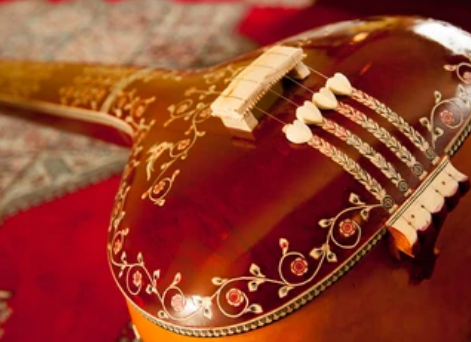Articles

Research on Instruments
Traditionally, a majority of Indian musical instruments are hand-made and the art of “making” of instruments is passed on from generation to generation, similar to the process of imparting the knowledge of Indian classical music itself. Whilst there are innumerable merits in this traditional system, it is believed that a research study to support the art of instrument making through scientific methods could be of great advantage.
A seminar on instrument makers (sitar, sarod and tanpura) was organized by ITC-SRA (Western Region) on14th February 1993. Many valuable suggestions were made at this seminar by several makers of instrument (from Miraj, Bombay, Delhi, Calcutta, etc.), musicians (including eminent musicians like Ustad Vilayat Khan, Pandit K G Ginde……), musicologists, connoisseurs. The
seminar covered three important areas, viz.
- Introduction of various instrument makers, the range of instruments they are making presently and their related problem areas.
- Methods employed for procurement of raw materials, their treatment / processing / seasoning, cost, transportation, etc., including discussions whether some of the parts could be machine made.
- Marketing of musical instruments
It was strongly recommended that a scientific research study should be undertaken by ITC-SRA with the following objectives :
- a) To study in details, methods and usages for the making of instruments with primary focus on sitar, sarod and tanpura i.e., string instruments. (This study could be followed by Phase II where making of other instruments could be taken up).
- b) Based on the above study, to evolve a time-bound program to improve quality and quantity of the product ion of musical instruments and make the same available to students of music at reasonable prices .
- c) To evolve scientific methods for testing the final product regarding the quality in relation to the price, with a view to offer a fair deal to the aspirant.
ACTION PLAN
- To undertake a survey of the present scenario with specific attention to the following
(1) RAW MATERIALS
- a) To determine different ingredients / components (types of raw materials) used in the making of sitar, sarod end tanpura.
- b) To identify the sources from where raw materials are being procured presently.
- c) To determine the basis of selection of raw materials by the “makers”.
- d) To assess the cost / price at which raw materials are procured.
- e) To investigate problems faced by the makers in the procurement and transportation of the raw materials from the source of procurement to the Place of “making” – to identify bottlenecks presently faced and determine costs of complete transportation.
- f) To study the methods used for storage of raw materials both in terms of stocking the same as well as methods used during storage for seasoning of wood, tumba, etc.
- g) To interview important makers to elicit their suggestions, to solve problems faced by them.
(2) ACTUAL MAKING OF INSTRUMENTS
- a) To study methods and systems used presently for the “making” of instruments.
- b) To analyse the quality and quantity of labour used in terms of time taken and costs thereof.
- c) To determine capital / finance required and related problem areas.
- d) To investigate the extent of mechanization (if any) presently being used by traditional makers.
- e) To determine the number of instruments that the makers are able to produce within a given time-frame as juxtaposed with the demand for the instruments.
(3) MARKETING OF FINI SHED PRODUCT
- a) To determine what percentage of instruments are sold at the showrooms of the “makers” and their personal efforts required to sell directly to music shops / customers, etc.,
- b) To determine whether the “makers” have any definite pricing policy.
- c) To investigate methods employed for finishing the product in a sophisticated manner and pack the same for safe transportation to the ultimate user.
CONCLUSION
Several of the above issues were discussed at the Seminar on Instrument Makers by the participants. However, it is essential to investigate various issues in greater details by personal visits to the instrument makers in their home-towns to elicit complete and authentic information. A survey of this nature would greatly assist to focus required attention on significant problem areas in terms of procurement, making and marketing of musical instruments. From the data collected, basic guidelines could be evolved for an action plan.
ACTION PLAN
(1) RAW MATERIALS
(a) To conduct research to identify alternative sources for procurement of raw materials if found advantageous.
(b) To explore possibilities of improving systems and methods employed for selection and procurement of raw materials from traditional sources.
(c) To investigate the possibilities of procuring raw materials in bulk with a view to effect economy and safe transportation, professional storage and scientific preservation.
(d) To test presently used raw materials through scientific methods a evaluate their musical values.
(e) To conduct research for the substitution of presently used raw materials, (wood, gourde, etc.), with a view to improve the quality of musical instruments through the use of high quality raw materials.
(2) SEASONING, PROCESSING, MAKING
(a) To conduct research with a view to evolve quicker, easier and scientific methods for seasoning of raw materials
(b) To identify gadgets, tools, machines that could be used for the purpose of scientific processing and “making”.
(c) To determine whether some parts / components could be standardized and machine-made instead of being hand-made with a view to obtain quicker and more reliable products.
(d) To evolve scientific methods to test such components with a view to evaluate their quality for perfect tone production.
(3) FINISHED PRODUCT (INSTRUMENTS)
(a) To evolve methods for scientific testing of finished instruments to ensure high quality products.
(b) To establish a marketing / assistance unit to act as an intermediary between the instrument makers and ultimate buyers. Such a unit could extend all assistance to market instruments both nationally and internationally. Such a unit can also advise on scientific packaging of instruments.